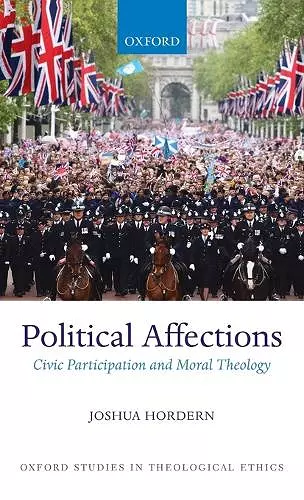Political Affections
Civic Participation and Moral Theology
Format:Hardback
Publisher:Oxford University Press
Published:20th Dec '12
Currently unavailable, and unfortunately no date known when it will be back

What is the nature of affections such as joy, compassion, sorrow, and shame and what role do they play in politics? While political experience is replete with affectivity, the affective dimension of political experience has typically been under-conceptualised in political theory. Joshua Hordern argues that Christian political theology and contemporary theory of emotions have resources to respond to this challenge and, in so doing, to offer diagnoses and remedies for the political alienation and democratic deficit which trouble contemporary political life. Hordern contends that affections have a cognitive aptitude whereby they become enduring features of shared political reasoning. In conversation with Martha Nussbaum, Jürgen Habermas, Roger Scruton, Oliver O'Donovan and other political thinkers both classical and contemporary, his argument interrelates affections with memory, moral order, death, suffering, virtue, neuroscience, familial life and national identity. In contrast to dualisms which would separate reason from affection and theology from politics, Hordern describes the way that affections' role in politics is shaped by the eschatological commitments of political thought. Through close attention to Deuteronomy, Luke and Acts, Hordern considers the role of affections in institutions of political representation, law and healthcare. Over against post-national visions which underplay locality in human identity, the account of political affectivity which emerges suggests that civic participation, critical patriotic loyalties, social trust and international concern will be primarily galvanised by the renewal of local affections through effective political representation. Moreover, churches, shaped by the affective vision of their Scriptures, are to embody the joyful, hopeful affective life of the Kingdom of God and thereby offer renewal to social and political experience at local, national and international levels.
Worth reading, and worth reflecting upon. * James G. Mellon, Independent scholar, Political Studies Review *
In this important, ambitious book, Joshua Hordern argues for a positive understanding of the affections and for their essential functions in political life His argument throughout is theological and apologetic. What he says positively is, in this reviewers judgment, persuasive * Victor Lee Austin, Studies in Christian Ethics *
This skilful and sophisticated interdisciplinary engagement extends and deepens arguments and scholarship on how Christian worship, Christian theology, and faith shape our political engagement with civil society * Aaron Klink, Religious Studies Review *
Political Affections merits close study by political scientists, theologians and church people interested in the public square and the common good ... the detailed arguments evidence good and thoughtful scholarship ... Perhaps Horden's book will prove but the first born of the family of atheologically affective politics ... not I hope its only child. As such it is to be warmly welcomed. * Peter Hampson, New Blackfriars *
Hordern drills down into an underserved area of both politics and theology and the affections. In this conversation between the two disciplines, he offers readers a theologically and philosophically rich account of the affections, coupled with an argument that such an account is crucial for contemporary European society and politics. Hordern's research is excellent, and his documentation is thorough. His use of Scripture and his treatments of the thought of Augustine, Nussbaum, and Habermas will interest theologians of all backgrounds. * Daniel J Daley, Choice Review Online *
Political Affections is a significant addition to our conceptual understanding of the nature and role of affections in politics ... This book, which recommends a renewal of political affections, is not simply an attempt to re-conceptualize the cognitive connections with political theory and theology, although that is certainly an important task of this book. It is primarily a call, by the presence and power of the Holy Spirit, to the crucified and resurrected body of Christ to assume its rightful place in the civic arena. * Stephen King and Michelle King, Christian Scholars Review *
Political Affections is of value to evangelical leaders in that it gives intellectual ballast to our instinctive conviction that the local church is at the centre of God's plans for his world. however, it does so in a way which refuses to set devotion to church against political engagement. ... This is a serious academic book, worth reading as in time it may be found to have given a road map to faithful ways of living out the gospel in our generation. * Peter Sanlon, Churchman *
Political Affections is a rare treatment of a topical issue. The book directs our attention to a neglected yet powerful dimension of human sociality: the role that affections play in the web of loyalties and negotiations that make up the political life. The book proceeds in a refreshingly imaginative way, by interweaving serious interpretative analysis of ancient and modern authors with illuminating explorations of the real life of citizens in contemporary democratic societies. It also demonstrates that a theological vision is needed, if political affections are to be understood not essentially as modes of manipulation but rather as forms of civic participation. * Bernd Wannenwetsch *
Political Affections is a timely and important book. Deeply rooted in biblical sources and contemporary philosophy, it provides a needed theological contribution to secular debates about cosmopolitanism, civic identity, and constitutional patriotism. At the same time, Horderns learned examination of the role of affections in social life advances both moral and political theology by offering a rare bridge between them. This work signals a major new voice in European political theology. * Eric Gregory, Princeton University *
ISBN: 9780199646814
Dimensions: 222mm x 147mm x 23mm
Weight: 540g
324 pages